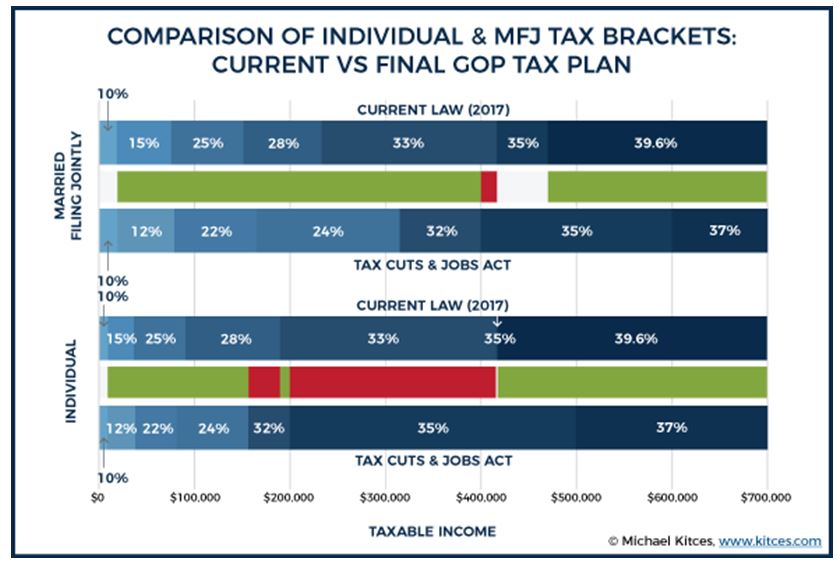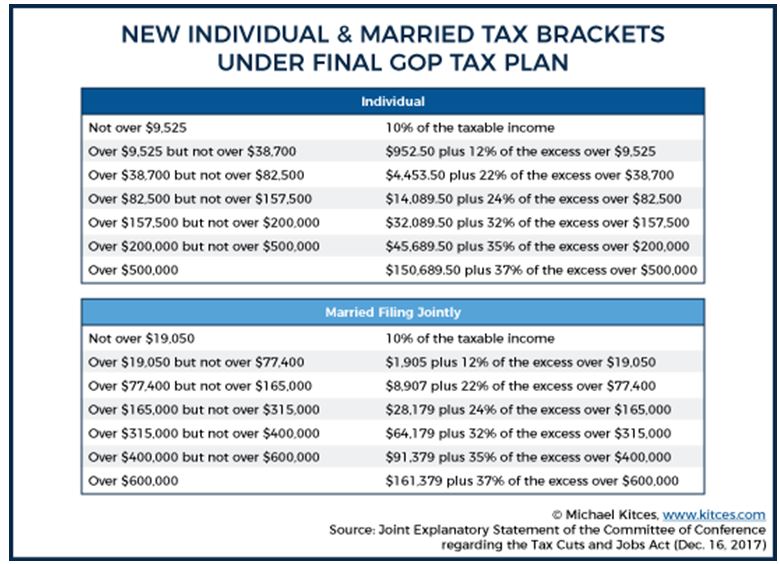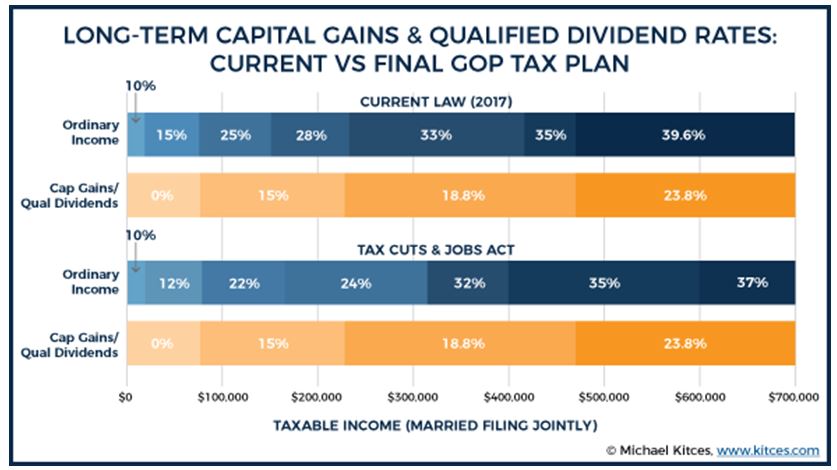How does the tax reform affect you?
How Does the Tax Reform Affect You?
Summary of The Tax Cuts And Jobs Act of 2017
Major tax reform does not happen often. Some say that it is the biggest tax overhaul in 30 years, but it's not the biggest cut. After many negotiations in both the House and Senate, a final reconciled version of the Tax Cuts and Jobs Act of 2017 passed on December 20th, and is expected to be signed (and become law) by President Trump. Most individuals will see lower taxes until 2025. Below is our current understanding of the tax reform. The tax complexity means there will continue to be value for tax planning advice.

In summary:
- Income tax: Lower income tax for most people. See summary tables.
- State and property taxes: Lower deduction (cap of $10,000) with a combination of state / local property and income taxes. The $10,000 limit applies for both individuals and married couples (marriage penalty). Big cities in blue states, tend to be both higher-taxed and wealthier, meaning people there could be hit the hardest.
- Standard deduction: Higher ($12,000 for individuals and $24,000 for married couples) standard deduction with a consolidation of the standard deduction and personal exemptions. For many, it is a tax benefit but not for a family with one or more children.
- AMT: increase the AMT exemption up to $70,300 / $109,400, for individuals / married couples. The phaseout of the AMT exemption rises as high as 35% up to a $500,000 / $1,000,000. It will be difficult for most people to be subject to the AMT.
- Child Tax Credit: The expansion to $2,000 (per qualifying child) of the Child Tax Credit (including an increase of the income phaseout) will create tax savings for many people.
- Mortgage interest: Lower cap on mortgage interest deductibility on the first $750,000 of debt. Any existing mortgages (and refinance) keep their deductibility of interest on the first $1,000,000. Interest on home equity loans are no longer deductible.
- 529 plan tax-free distributions (up to $10,000 per student each year) can now be used for elementary/secondary school (public, private, religious, or homeschooling) expenses.
- Roth IRA: End of recharacterizations of Roth conversions.
- Itemized deductions: End of all miscellaneous itemized deductions that are subject to the 2%-of-AGI floor (tax preparation expenses, unreimbursed employee business expenses, including the home office deduction, losses on a variable annuity, safety deposit box fees, depreciation of home computers used for investments, and the deduction for investment advisory fees). We guess that a small percentage of households will itemize deductions in the future.
- End of marriage “penalty” for most, and small marriage “penalty” for upper income individuals (37% tax bracket for individuals with $500,000 of income, but “only” $600,000 of income for married couples).
- Estate tax: Higher $11.2M individual estate tax exemption (or $22.4M for married couples) with the same top 40% tax rate on gifts and estates. Note that while few people are subject to the federal estate tax, many more may be subject to the state estate tax (maybe $1M exemption depending on the state).
- Obamacare: Elimination of the Affordable Care Act’s mandate that individuals buy health insurance or pay a fine.
- Alimony payments would no longer be deductible by payors, nor reportable by recipients (only apply to divorce agreements after December 31st of 2018 or for prior agreements that are explicitly modified to adopt this provision in 2019 and beyond).
- Nonqualified deferred compensation plans will be taxable when it becomes vested (not when it is paid).
- End of moving expense deduction.
- Trust income: Tax cut from 39.6% down to 37% on the majority of trust income (above $12,500).
- New children Kiddie Tax unearned income (portfolio income) tax brackets (37% on any income over $12,500).
- New $500 qualifying dependent credit.
- Estimated business taxes: it is allowed to pay your 2017 estimated business taxes by the end of 2017 (and not in early January of 2018) to obtain the 2017 deduction.
- Business Entertainment Expenses. End of deduction for activities like entertainment and amusement (food and beverage expenses associated are still deductible).
- New Qualified Business Income deduction (20%). Pass-through businesses (partnerships, LLCs, S corporations, and sole proprietorships filing Schedule C) will be taxed on only 80% of their pass-through income. With the 20% QBI deduction, self-employed individuals may have a lower tax rate than employees doing the same work. We guess that some employees may become independent contractors with the new tax laws.
- Large tax reform for corporations (single 21% tax rate permanently).
>> It is still possible to pay 4th quarter (or the full year’s) 2017 state taxes or prepay property taxes by year-end in order to obtain the deduction this year.
>> Self-employed people and freelancers may want to pay their 2017 taxes before December 31 (vs. January 15).
>> If you buy a new car before the end of the year, you may deduct all of the sales tax you pay on that purchase on your 2017 tax return.
For more details, you can find the 1,000+ pages of the Tax Cuts and Jobs Act at Final legislative text as enacted (supporting Conference Committee notes).


Pursuant to IRS Circular 230, the Internal Revenue Service requires us to inform you that any tax advice included herein is not intended or written to be used, and it cannot be used by any taxpayer, for the purpose of avoiding penalties that may be imposed on the taxpayer. We are not tax expert and you must rely on the advice of your own tax and legal counsel.

This newsletter was first published in December 2017
https://mailchi.mp/bourbonfm/who-do-you-trust-more-bfm-brings-peace-of-mind-1189193?e=d68f9c2d38













